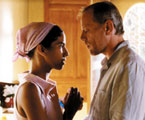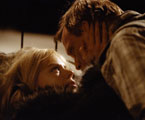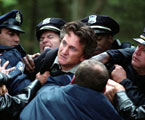 |  |  |  |

|
||||
 |
||||
|
Keeping all the above in mind, the annual complaints about the program going to the dogs seem beside the point, especially if you consider Culture of Complaint being a standard New York MO. What ultimately counts is that the thing sells. Really. Most shows are genuinely sold out, last time I looked. So what do you know.
What also counts is that the festival program was a fair representation of the Year on the Festival Circuit, and then again some. At the top of many lists was the 800-pound gorilla of festivals, the 125-minute-long oeuvre by Lars von Trier called Dogville. In his interview, Mr. von Trier said, "There's a limit to how nice a film should look. If it looks too nice, I throw up." Guess what: Dogville made me throw up. Okay, so three years ago I had walked out on Dancer in the Dark, stumbling down the steep stairs of Palais des Congress and murmuring, Never again. But then I came home and watched his The Kingdom again, which is absolutely the best TV ever made. It's like St. Elsewhere on acid. Alas, Mr. von T's undeniable talents were outstripped by his ego long ago. Dogville is a crude pastiche of bad Brecht, bad high-school version of Our Town, and, finally — let's get up close and real here — a very, very boring case of Americanophobia. Not as bad as some of the quickies that make up 9/11, but at least those were mercifully short. A programmatic story of a beautiful girl (Nicole Kidman, whose natural wooden-ness is actually a good fit here) stranded in a small Depression-era Colorado town and vilely abused by its hypocritical residents, all droned in the monotonous translated-from-Danish dialogue and shot on a soundstage in Sweden (Mr. von T doth not travel to this imperialist Sodom and Gomorrah)… Of all the Dogma flicks, this is the most dogmatic. (I'm running out of vitriol here, fast.) And if it was indeed such a "universal" story as Mr. von T would have us believe, what was Nixon doing in the closing credits? Rarely have hypocrisy and boredom been joined as seamlessly as they have in Dogville.
Dogville was easily the worst film in the program — not the worst made, but one sunk by its own pretense. So I'll spare you the artsy boredom of Goodbye, Dragon Inn and TV-ness of PTU, a film for those who can't get enough of the Chinese police bang-bangers, and we'll move on to good stuff, some of it better than the rest. There was an Italian TV series (6 hours) called The Best of Youth, made by Marco Tullio Giordana — a history of an Italian family from the '60s through our time. There's not much to say for it artistically — Ettore Scola did a far superior job in the two-hour-long The Family in 1987, and Mr. Giordana's sampling of Italian society is, well, narrow — it's like doing an American saga based on the lives of New York's Upper West Siders) — but it has a slow, generous sweep, and anyone who has a soft spot for that country and its history will be easily won over. Oddly, not only did the program feature Marco Bellocchio's Good Morning, Night, another film dealing with one of the highlights of the same period — the 1978 kidnapping and execution of Aldo Moro by the Red Brigades — but the two films shared the same stars. Alas, Bellocchio, one of the angry young men of the '60s (Fists in Pockets, China is Near), made a film just as boring, though not as pretentious or hypocritical, as Dogville. Another holdover from the '60s, Claude Chabrol, fared as poorly with The Flower of Evil, an expose of French provincial bourgeoisie — all well and good, but again? A retread is a retread is a retread.
One should not omit Mystic River, if only for the sheer size of the photographer crowd that greeted its director, Mr. Eastwood; it's a solemn, somber, solid thriller that, despite a crisp script and fine ensemble acting, never transcended the genre. But it was another US entry, Gus Van Sant's Elephant, that kept me on the edge of my seat. As a camera verite (footprints of Frederic Wiseman all over) recreation of a Columbine-like massacre, Elephant sends more tingles down your spine than most genre thrillers ever will. Perhaps its most distinctive feature is Van Sant's refusal to take sides and point fingers. Everybody had a hand in what happened — the gun traders, the video games, the school bullies — and therefore one cannot expect quick fixes in the form of Congress passing bills. The banality of evil has become a trite notion these days, but rarely has it been served with such visceral power.
Mystic River and Elephant are both on their way to your multiplex, but the whole point of every festival, this one being no exception, is seeing the films that distributors have passed on, such as Jacques Doillon's Raja or Julie Bertuccelli's Since Otar Left. One way to describe Raja, or at least the first half of it, is the kind of film Eric Rohmer would have made if he had traveled to Morocco and smoked a lot of hash. It's just as talky and filled with as many failed attempts to communicate. As Fred, a rich Frenchman living in colonial splendor in Morocco, is desperately trying to seduce Raja, a humble Moroccan girl working for him, we get a nuanced multi-layered overview of Western neuroses multiplied by wealth confronted with third-world trickery borne of hopeless poverty. Some of it is comedic, and most of it is irritating, but eventually you get caught in the most circular of plots, with poor Raja at the center of it, pulled and pushed by her adopted family, her scoundrel fiancé, and Fred who has no idea what he wants.
The (ex-Soviet) Georgia of Since Otar Left is almost as poor as Morocco, with as many dreams of France, but its noble-minded characters are the opposite of Raja's — three generations of proud women sharing a tiny apartment and yearning after their son/brother/uncle who is eking out an illegal living in Paris. The film is leisurely paced, sometimes even plodding, but it's all about familial love and lies. A four-hankie heartbreaker.
If the festival opened on a less-than-promising note with Dogville and Mystic River, its closing was more exciting, with Denys Arcand's The Barbarian Invasions, a sequel (though Mr. Arcand doesn't like the word) to his popular The Decline of the American Empire. The Quebec intellectuals from Decline have now aged, and they gather a la The Big Chill to say goodbye to a friend on his deathbed. Mr. Arcand's ear is perfectly pitched for both comedy and drama, and he merges them artfully: a hilarious denouncement of the Canadian socialized health system (the characters of mafia-like union gorillas are alone worth the price of admission) is followed by a nudge at the Great Neighbor to the South (never as vicious as von T's), gentle affection for the leftist silliness of an era gone smoothly segues into a father-son scene that is every bit as moving as the abovementioned satire is scorching. Invasions does not reach for the stars, but in its own way it's a perfectly made film.
The festival closed with 21 Grams by Alejandro González Iñárritu of Amores Perros fame. Mr. Iñárritu has talent to burn, and passion to spare, and, as in Amores Perros, he floods the screen with tableaux that are both violent and emotional. However, he still seems very young in his disdain for linear narrative, turning the first hour into a highly irritating jigsaw puzzle, viewing his three groups of characters from high above and catching blood-curdling scenes from their lives with a flashlight. The scenes are expressive and intriguing enough to put your brain to work, trying to establish their sequence and the relationships between the characters, but it's an effort that properly belongs on LSAT. It all makes sense halfway through, though one could easily do without the solemn pseudo-poetic voiceover, which is just as redundant as Mr. Iñárritu's games with time and place. To tell you the actual plot would be to spare you the agony of the first hour and not quite fair to the director. The ensemble acting is every bit as fine as in Mystic River, led once again by the ubiquitous Sean Penn as the professor getting a heart transplant (in Mystic River, he was striking as hoodlum turned paterfamilias). He is easily matched by Benicio del Toro as an ex-con who rages against God and man and fights to change his life against all odds.
Festival Web site: 41st New York Film Festival Photos courtesy of the 41st New York Film Festival.
|
|